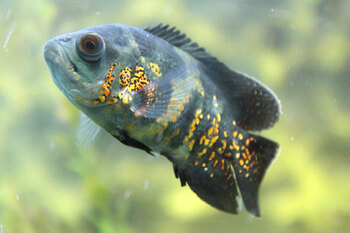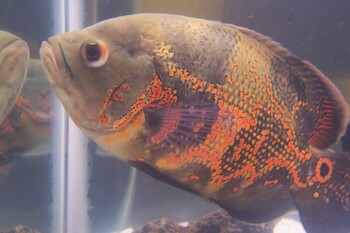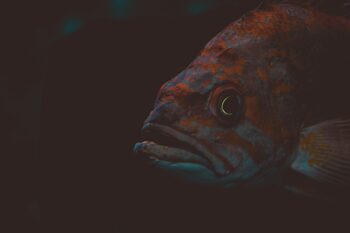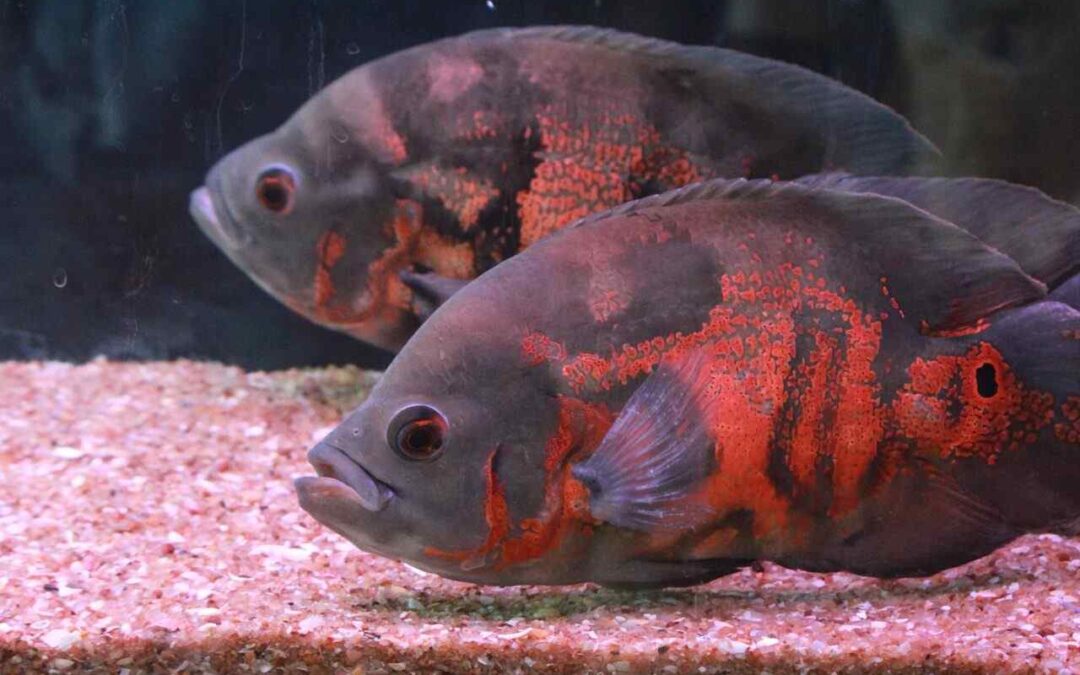When you stroll into a pet store, it’s hard not to notice the Oscar fish. With their bold colors, expressive eyes, and curious behavior, they often stand out from the rows of smaller, calmer species. Unlike many aquarium fish that simply swim back and forth, Oscars seem to have a real personality. They’ll watch you from inside the tank, follow your finger along the glass, and sometimes even beg for food like a puppy. Many aquarists describe them as interactive and surprisingly affectionate, making them feel more like companions than just ornamental fish.
But here’s the thing: as charming as they are, Oscars aren’t a “spur of the moment” pet. Before you bring one home, it’s worth knowing exactly what kind of responsibility you’re signing up for.
At first glance, they may seem manageable. In most stores, you’ll see them as small juveniles—only about 2–3 inches (5–8 cm) long. They look tiny, even delicate, and it’s easy to think they’ll stay that way. But the reality is very different. Oscars are fast growers, and within just 6–12 months, they can reach two-thirds of their adult size. That means the little fish you pick up today could be pushing 7–8 inches before you know it.
As they continue maturing, most Oscars grow to about 10–12 inches (25–30 cm), and in large, well-maintained aquariums, some individuals have been known to grow even larger. Their rapid growth is impressive but also demands preparation—everything from tank size and filtration to food supply needs to scale up quickly.
And growth isn’t the only thing to think about. Along with their size comes a surprisingly long lifespan. With the right care—plenty of space, a balanced diet, and clean water—an Oscar fish can live anywhere from 10 to 20 years. That means they’re not just a short-term addition to your aquarium; they’re a long-term companion that can be with you for a good portion of your life.
So, while it’s easy to fall for their charm in the store, keeping an Oscar isn’t just about admiring their colors. It’s about committing to years of care, attention, and interaction—something that makes them one of the most rewarding, but also one of the most demanding, freshwater fish to own.
Let’s dive deeper into what determines the average lifespan of an Oscar fish, what you can do to extend it, and whether they’re the right fit for your home aquarium.
The Average Lifespan of Oscar Fish
On average, Oscar fish live 10 to 12 years in home aquariums. But here’s the exciting part: with the right care—meaning plenty of space, a healthy diet, and excellent water quality—many Oscars live closer to 15 to 20 years.
This lifespan puts them in the same category as goldfish and koi, two other long-living freshwater fish. In fact, they live much longer than common aquarium species like bettas (2–5 years) or tetras (5–7 years). So when you bring home an Oscar, you’re not just making a casual purchase—you’re making a long-term commitment.

Growth and Development: From Tiny Juvenile to Tank Boss
One of the most fascinating things about Oscars is how fast they grow.
- In pet stores, you’ll often see them as tiny juveniles, only 2–3 inches (5–8 cm)
- Within just 6–12 months, they can shoot up in size, reaching two-thirds of their adult length.
- By adulthood, most reach 10–12 inches (25–30 cm), with some even larger if kept in very spacious tanks.
That rapid growth spurt means you can’t just toss an Oscar in a small starter tank and expect them to thrive. They need space, nutrition, and careful planning from the start—otherwise, their health and lifespan can be cut short.
Factors That Affect an Oscar’s Lifespan
Just like humans, not all Oscars live the same number of years. Their longevity depends heavily on care, environment, and genetics. Here are the most important factors:
1. Tank Size and Environment
Oscars are big, messy, and active fish. A cramped tank will not only stunt their growth but also stress them out, leading to a shorter life. For one adult Oscar, you’ll need at least a 55–75 gallon tank, though larger is always better.
2. Water Quality
Oscars are sensitive to poor water conditions. Ammonia, nitrites, and high nitrates can quickly lead to disease. A strong filtration system, regular water changes, and stable water parameters (temperature around 74–81°F / 23–27°C, pH 6–8) are essential.
3. Diet and Nutrition
In the wild, Oscars eat insects, crustaceans, and small fish. In captivity, they do best with a balanced diet of high-quality pellets, supplemented with frozen or live foods like bloodworms, shrimp, and the occasional vegetable. Avoid feeder fish, as they often carry parasites and provide poor nutrition.
4. Tankmates and Stress
Oscars are semi-aggressive and territorial, especially as they mature. Poorly chosen tankmates can lead to fights and injuries, which shorten lifespan. They do best either alone, with another Oscar in a large tank, or with equally robust cichlids.
5. Genetics and Breeding
Some Oscars bred in poor conditions may inherit weaker genetics, which can affect their growth and overall health. Buying from a reputable breeder or store increases your chance of getting a healthy, long-lived fish.
How to Help Your Oscar Live Longer
If you want your Oscar to live closer to 15–20 years, here are some tips:
- Get a large enough tank from the start. Don’t assume you can “upgrade later”—Oscars outgrow small tanks fast.
- Invest in strong filtration. These fish are messy eaters and produce a lot of waste.
- Feed a varied diet. Quality pellets should be the staple, but add frozen shrimp, worms, and vegetables for balance.
- Perform regular water changes. Aim for 25–30% weekly to keep water clean and stable.
- Provide enrichment. Oscars are intelligent and get bored. Add rocks, caves, and safe decorations for them to explore.
- Monitor their health. Watch for signs of illness such as loss of appetite, clamped fins, or lethargy.
Common Health Issues That Shorten Lifespan
Even with good care, Oscars can be prone to a few health problems. Catching these early can make the difference between life and death:
- Hole-in-the-Head Disease (Hexamita): A parasitic condition linked to poor diet and water quality.
- Ich (White Spot Disease): A common parasite that causes white spots and can spread quickly.
- Bacterial Infections: Often caused by injuries or poor water conditions.
Preventing these issues comes down to clean water, proper diet, and reducing stress.
Additional Insights into Oscar Lifespan
Now, let’s dig deeper with some details that many guides leave out.
Oscars Compared to Other Popular Fish
- Goldfish: Often live 10–15 years, similar to Oscars, though some reach 20.
- Betta fish: Average 2–5 years—much shorter.
- Angelfish: 8–12 years, but usually don’t outlive Oscars.
This makes Oscars one of the longest-living aquarium fish commonly kept by hobbyists.
Signs Your Oscar Is Aging
As your Oscar gets older, you may notice:
- Slight fading in color.
- Less frequent bursts of activity.
- Slower response at feeding time.
- Longer resting periods.
These are normal parts of aging, though regular care helps them remain active into their later years.
Mistakes That Cut Lifespan Short
- Keeping Oscars in bowls or tiny tanks. This leads to stress and stunted growth.
- Overfeeding fatty foods. Obesity is just as dangerous for fish as it is for people.
- Skipping water changes. Oscars produce a lot of waste; dirty water quickly shortens their lifespan.
- Adding the wrong tankmates. Small fish become food, while aggressive ones cause injuries.
Fun Facts About Oscars and Longevity
- Oscars recognize their owners and can even learn feeding schedules.
- They can live so long that kids who grow up with one may leave for college while the fish is still alive at home!
- Some owners report Oscars “pouting” when ignored, showing just how social they are.

Are Oscars the Right Fish for You?
Before you commit, ask yourself:
- Do I have room for a large tank?
- Am I ready to maintain strict water quality?
- Can I handle a fish that may live 15 years or more?
- Am I okay with owning a fish that might not play nicely with others?
If you answered “yes,” Oscars can be incredibly rewarding. They recognize their owners, beg for food, and even seem to “play” with people outside the tank. They’re not just aquarium fish—they become part of the family.
FAQs About Oscar Fish Lifespan
Q: How long do Oscars live in captivity?
A: On average, Oscars live 10–12 years, but with great care, they can reach 15–20 years.
Q: How big do Oscar fish get?
A: Most adults reach 10–12 inches (25–30 cm), though some can grow even larger in spacious tanks.
Q: Do Oscars grow quickly?
A: Yes. They often reach two-thirds of their adult size within their first year, then slow down as they mature.
Q: Can poor water quality shorten their lifespan?
A: Absolutely. Poor water conditions lead to stress, disease, and early death. Clean, stable water is critical.
Q: Are Oscars beginner-friendly fish?
A: Not really. They require large tanks, strong filters, and consistent care, making them better suited for intermediate to advanced aquarists.
Q: Do Oscar fish live longer in the wild?
A: In the wild, Oscars usually live around 10–12 years due to predators and natural challenges. In captivity, with proper care, they can live longer—sometimes up to 20 years.

Final Thoughts
Oscar fish are more than just striking pets—they’re long-term companions. With an average lifespan of 10–12 years and the potential to reach 20 years, keeping one is a big responsibility. They grow fast, eat a lot, and need plenty of space, but in return, they offer personality and interaction unlike most aquarium fish.
If you’re prepared to provide the right care, an Oscar can be with you for over a decade—becoming not just another fish in a tank, but a true member of your household.






